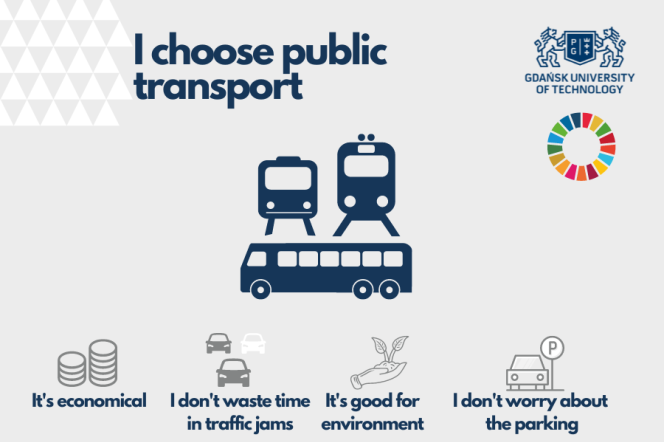Date added: 2023-06-21
I choose public transport

In the period from March 2022 to April 2023, in the city of Gdańsk, the city and commune of Pruszcz Gdański, the city and commune of Żukowo and the commune of Kolbudy, the Gdańsk Traffic Research was carried out to learn about daily transport habits of the respondents. For the purposes of the study, the term of travel was defined, which is understood as any movement for a specific purpose by any means of transport or on foot. According to the report summarizing the research, the most time consuming travels were made on the route: university-home (37 minutes), home-university (34 minutes), work-home (33 minutes) and home-work (28 minutes).
Traveling by car
Taking into account the results of the report and the longer term, it takes an average of 240 hours a year to travel to and from work or university, based on a 5-day/week round trip. In case of people traveling by car, this means time spent sitting still. For people who have a sedentary office job, traveling by car means an extra hour in this position. Considering the whole year, it is equal to sitting still for 24 days, often alone, because research shows that on average 1.2 people travel in a single passenger car. A large part of the respondents travel in this way - 45% of the trips took place by car. Among the reasons for choosing this means of transport, the passengers most often indicated convenience, shorter travel time and no need to change trains.
Changing habits
It's worth looking at commuting as a time that can be more than just a necessary trip. It is true that traveling by car can be convenient, but this convenience costs a lot - it limits daily physical activity, it is often more expensive than public transport, it contributes to increasing air pollution and traffic. Considering that many people do not find time for regular physical activity, traveling by public transport and walking to the bus stop can be a daily dose of exercise, which in the long perspective will certainly bring health benefits. This is a good reason to consider changing transport habits.
It must be remembered that changing habits in everyday life is a process that begins in our mind. One of theories in psychology, known as the Transtheoretical Model of Change, divides the process of change into several stages. The authors of this approach prove that by understanding these stages, the process of change can be carried out faster and more effectively.
Initially, there is resistance to any suggestion of change. At this stage, the person does not believe that change is necessary. Defensive mechanisms such as denial, rationalization and projection can be activated. Next, the person begins to consider initializing a change, collects information, undefined plans of action appear. Some people may stay at this stage for a long time, constantly thinking about a change, but actually making no effort to change anything. The next step is to move to specific actions and introduce new habits. This is a time that requires a lot of commitment and energy. Along the way, there may also be temptations to return to previous habits.
Traveling by public transport
However, it is worth making an effort and take a closer look at our transport habits, collecting information about possible connections, transfer points, travel time and ticket price. If there is no convenient public transport connection from home to work or school, it may be worth considering combined transport and get to the transfer station by bike, scooter, car or on foot, from where travel can be continued by bus, tram or train.
Results of Gdańsk Traffic Research 2022 shows that the three main reasons for choosing public transport in everyday travel are the lower cost of travel, heavy traffic and satisfactory quality of public transport.
Chart 1. Reasons for using public transport when traveling

Source: Gdańsk Traffic Research, www.brg.gda.pl/
25.1% of respondents traveling by public transport were motivated by concern for the environment. Half of the reasons for using public transport concerned car parks - 25.1% of respondents indicated difficulties in finding a parking space at their destination, while 24.9% mentioned parking fees as the reason for using public transport.
If you want to assess the benefits of limiting or resigning from car travelling in everyday commuting, it is worth analyzing, among others, the costs associated with commuting, how long the journey takes and how much of that time we spend standing still.
Chart 2. Summary of the daily travel cost of a Gdańsk Tech employee from Pruszcz Gdański, assuming commuting for 20 days a month by car (1 person in the car) and public transport (normal monthly ticket on the route Pruszcz Gdański – Gdańsk Tech - Pruszcz Gdański).

Source: own data
Chart 3. Summary of the total daily travel time and its structure of a Gdańsk Tech employee from Pruszcz Gdański on the route: home-Gdańsk Tech-home by car and public transport (distance of 15 km).

Source: own data
Convenience and flexibility, which car users apreciate in everyday travel, can be replaced with extra steps every day, with time to read an interesting book or a talk to a friend who is returning home on the same bus. Small steps can help you change your transport habits, and we encourage you to do so.
We encourage you to visit the Gdańsk Tech Sustainable Development website, where you can find information about the implementation of the 17 Sustainable Development Goals at the Gdańsk University of Technology.

